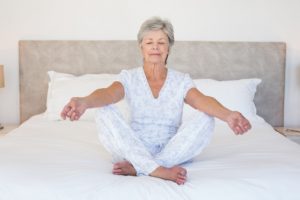 It is estimated that nearly 50 percent of insomnia cases are a result of stress; however, sleep experts have compiled a list of tips you can use to reduce stress and improve your sleep. If you find yourself tossing and turning at night, unable to sleep because of stress, these tips should help you get back to having a sound sleep night after night.
It is estimated that nearly 50 percent of insomnia cases are a result of stress; however, sleep experts have compiled a list of tips you can use to reduce stress and improve your sleep. If you find yourself tossing and turning at night, unable to sleep because of stress, these tips should help you get back to having a sound sleep night after night.
- Setting an alarm is a helpful trick to make sure you don’t wake up late, but it’s also beneficial if you turn the clock around so you aren’t checking the time throughout the night.
- Try breathing techniques as a means of reducing anxiety. Use your “out” breath to release anxiety and tension and imagine with each breath that stress is leaving your body.
- Now that you’re a bit calmer, try meditation. Count your in and out breaths: for example, 1-2 in, 3-4 out, 5-6 in, and so on. Don’t worry if you lose count—you can simply start back from one again.
- If your room is quiet, you can try meditating by listening to the sounds outside of your room.
- If breathing exercises and meditation aren’t successful, you can try a technique known as “paradoxical intention.” This involves staring at a point in your room for a long period until your eyes become so heavy that you close them and fall asleep.
If insomnia is a chronic problem for you, or if stress is affecting more than just your sleep, you should see your doctor for better guidance.
Advertisement
Related: Insomnia causes, symptoms, and natural remedies to sleep well without sleeping pills
